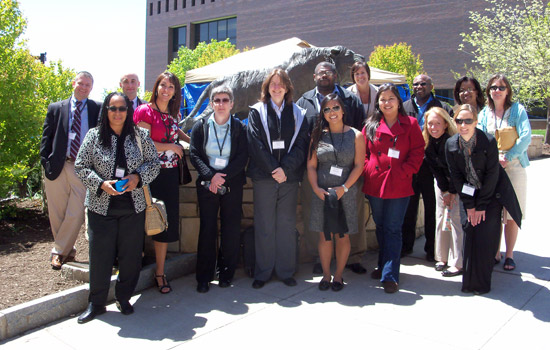Army veteran earning MBA from Afghanistan
Army veteran Harry Wescott says the online program is useful in his contract job with IBM
Harry Wescott (back row, fifth from right) with fellow online EMBA students.
Harry Wescott has a 3.74 GPA and works on his Executive MBA classroom assignments via the Internet in tents/rooms in Kabul, Afghanistan. The IBM intelligence contractor who heads a team of professionals for the International Security Assistant Force at Kandahar Air Field says the biggest reason he went after his online EMBA degree at Rochester Institute of Technology was because of the current state of the economy and the decrease in defense spending.
“I am a contractor, so when the DoD (Department of Defense) makes cuts, contracts are affected,” explains the 36-year-old Wescott. “I am worried about my livelihood and my ability to earn a living in the short term as we deal with a new normal, without major conflicts in Afghanistan and Iraq.”
Wescott works 12 to 15 hours a day, seven days a week for his job and spends about 30 hours a week on course work. He’s an early riser and tries to knock out a few of his class assignments and lectures from 0400 to 0700 hours (4-7 a.m.), do more reading at lunch and later in the day before he retires at 2230 (10:30 p.m.).
The online EMBA program in RIT’s E. Philip Saunders College of Business is a five-quarter, 15-month program that is cohort-based, meaning that students go through and finish the program with the same cohort team. Wescott is in his fourth quarter, which he will have completed by the time he returns home to the U.S. in December, with plans to complete his degree in February 2013.
“Harry faces some unique challenges with our program because it’s rigorous, comprehensive and tends to deliver more content/curriculum in 15 months than most other programs,” explains Marty Lawlor, director of RIT’s online EMBA program. “Harry also faces some unusual logistical challenges because his teammates and cohorts are all from the States. Team meetings are generally scheduled for evenings Pacific time because his teammates are from California and Arizona.”
A native of Philadelphia, Wescott “grew up in a house with a mother and father that were married, and I think they did a good job of raising us. My mother was a first-generation college graduate, going back to school after she had the three of us. My father never attended college.”
Sadly, Wescott returned home briefly to the States this past July to attend his mother’s funeral. “My mother went in for corrective surgery on two aneurysms in her head and did not make it out of the hospital,” he says. “Her passing made me realize how short life really is.”
Wescott started his career path after earning a B.S. degree in economics from West Chester University in 1999. He enlisted in the U.S. Army in 2000 and served as a Signals Intelligence Analyst in Fort Stewart, Ga., followed by stints overseas in South Korea, Kuwait and Iraq. He left Army life to work at Zel Technologies in Guantanamo Bay, Cuba, and then became employed at Trinity Technology Group in Al Asad, Iraq, before joining IBM in 2009.
Wescott says he was skeptical of taking an online course prior to entering RIT’s program.
“I thought it would be a walk in the park because of all the stories I have heard over the years with other universities,” he admits. “This is not the case with RIT. I have worked harder than at any other point in my academic career. This is a tough program and it brings out the best in you. It has provided me with knowledge that I use in my every day job at IBM.”
Meanwhile, Wescott is eager to come back home to his Woodbridge, Va., residence to be reunited with his wife, Judylynn, and their 5-year-old daughter, Juliana.
“The biggest benefit is that the online courses allow me to further my education while deployed in a war zone,” Wescott says. “I can fit in my studies around my work schedule and complete the majority of my course work toward my EMBA prior to my return to the States.
“I have been deployed the majority of my daughter’s life,” Wescott notes. “I want to change that and getting the EMBA is a step toward living with my family full time.”
And what does he miss most about home?
“Time off, the family, and the ability to do what I want, when I want, how I want, because I want.”








